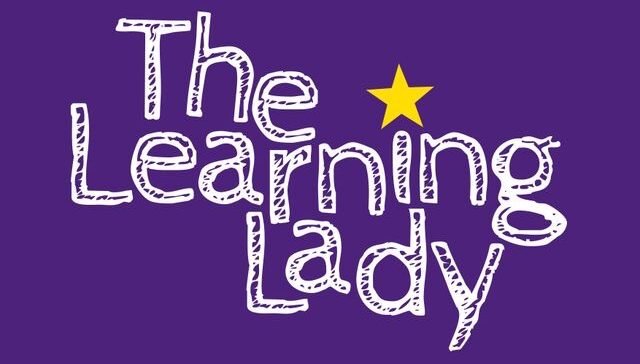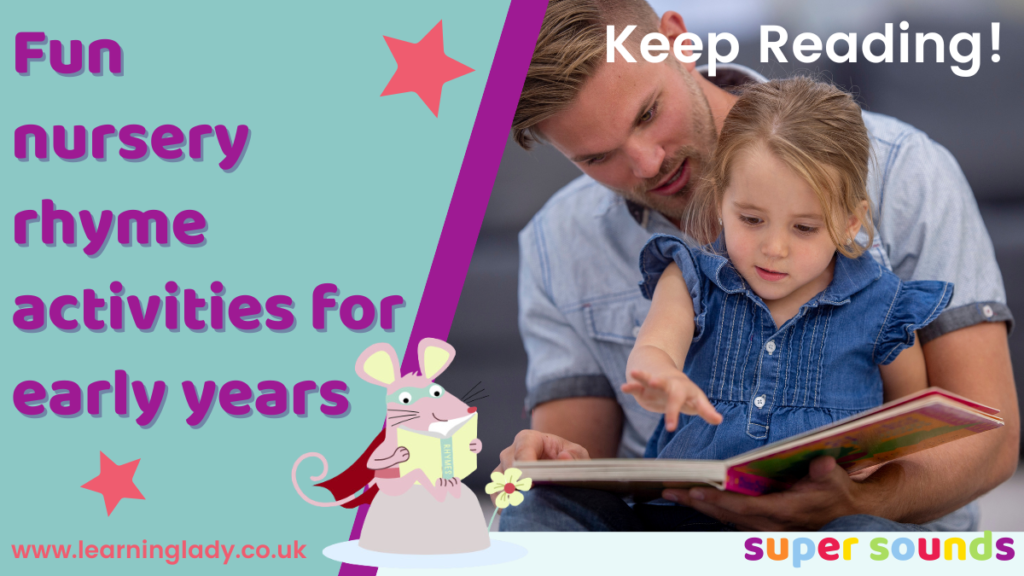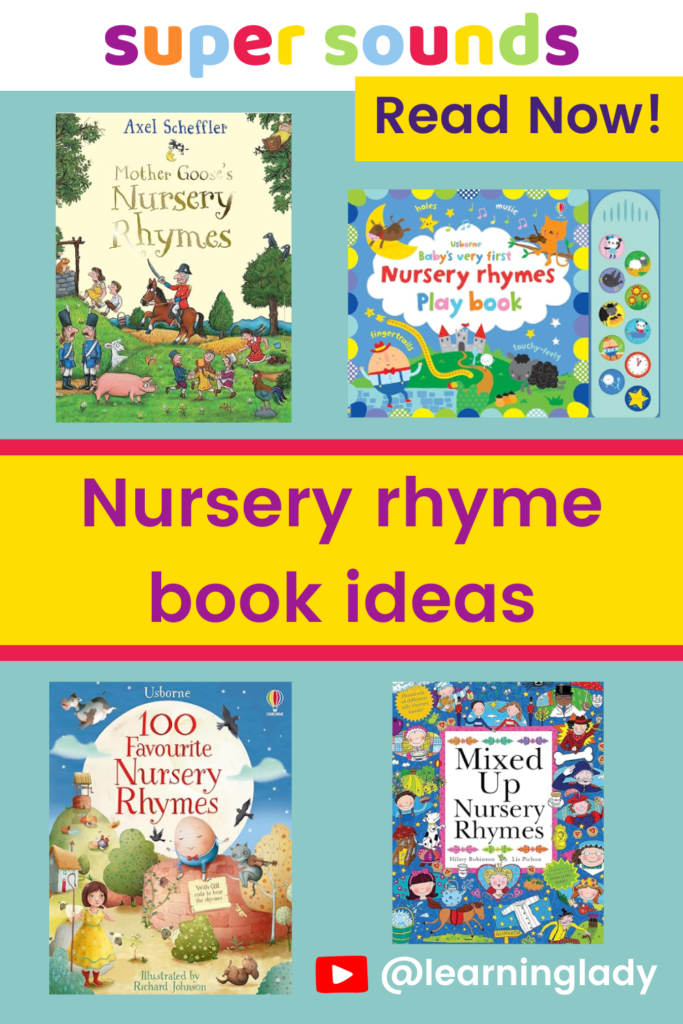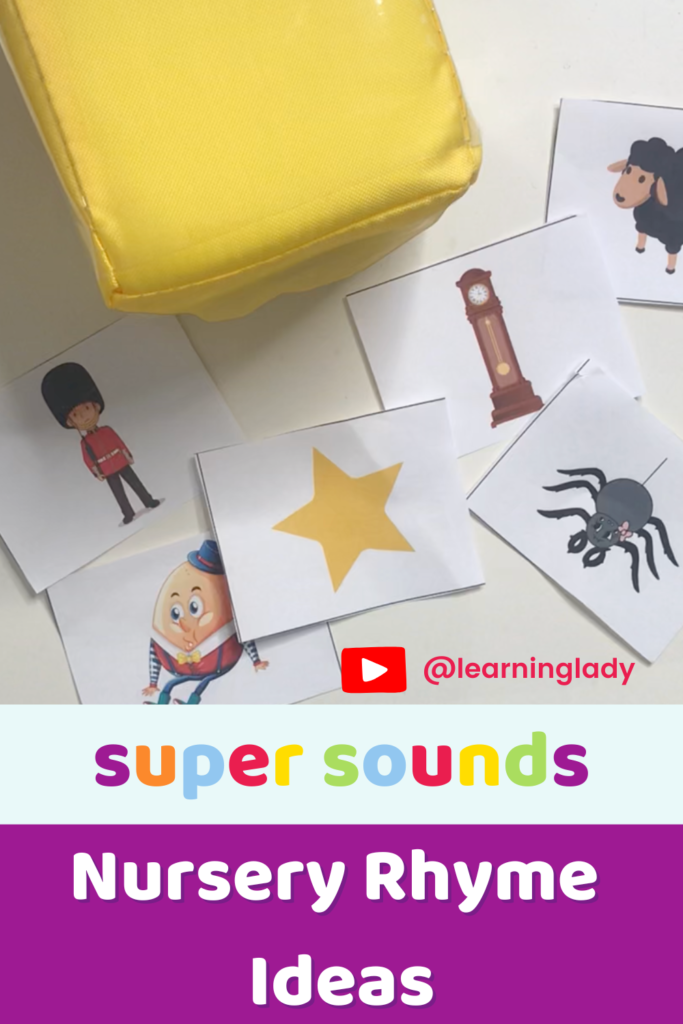Nursery rhyme activities for early years have always been a big part of early learning. I bet you remember singing nursery rhymes with your family or at preschool, and you probably had a favourite that you still remember!
Nursery rhymes for preschool can seem a bit old fashioned…
In today’s high tech, fast-paced world, the importance of nursery rhymes for early learning can sometimes get overlooked. The language can seem old fashioned and not very relatable to our 2,3- and 4-year-olds.
But nursery rhymes provide our children with a lot of learning potential.
Here’s the hidden magic of nursery rhymes…
Why nursery rhymes are important
Nursery rhymes build better brains, because they teach children to remember what they hear. This is known as auditory memory.
Firstly, 2, 3, and 4 year olds will be remembering the words and how to say them. Next, they’ll be remembering to say the words, sentences, and verses in order. A well-developed auditory memory is essential in readiness for reading and writing in school
Nursery rhymes and auditory memory
When nursery rhymes involve a tune or a singing element, there’s even more for children to remember.
In addition to remembering the words, they need to hold the tune in the working memory too.
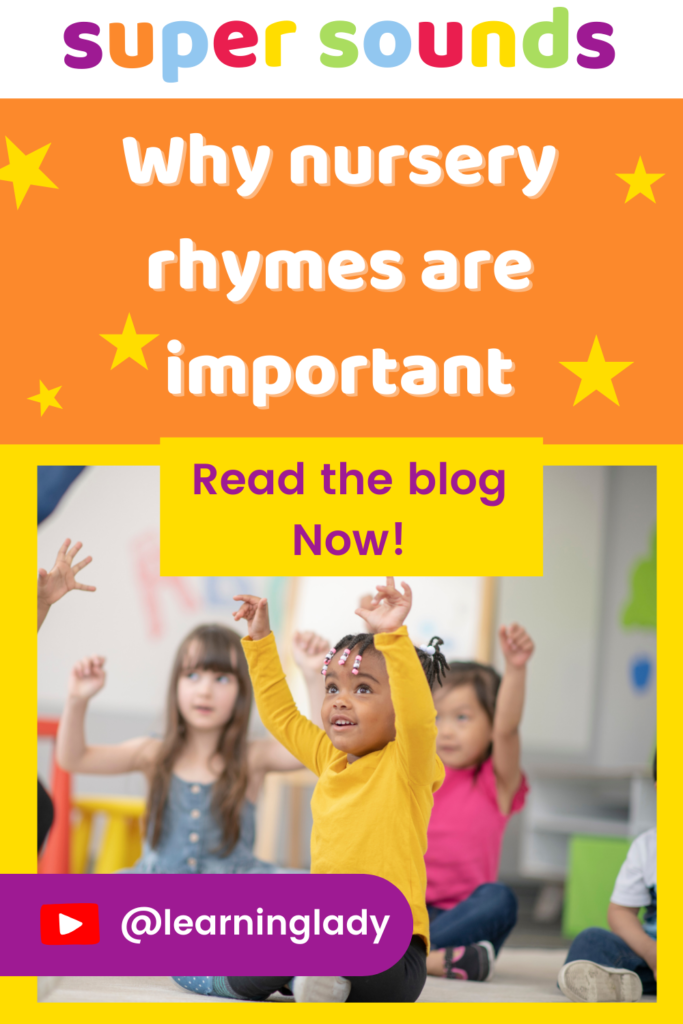
The brain is challenged to remember and replicate the order of the tune at the same time as the words. This uses and links different parts of the brain at the same time.
An essential learning and development tool
Action rhymes are even more challenging because movement is involved.
Controlling physical body movements occurs in another part of the brain, so there’s even more brain activity required.
By remembering and recalling words, tunes and actions simultaneously, preschoolers are giving the brain a full-on workout.
This is essential preparation for memory building for learning and development in all areas, both in preschool and beyond.
How do nursery rhymes help language development?
If you’re convinced about the impact of nursery rhymes on memory but are also wondering ‘how do nursery rhymes help language development?’, then here are a few things to consider.
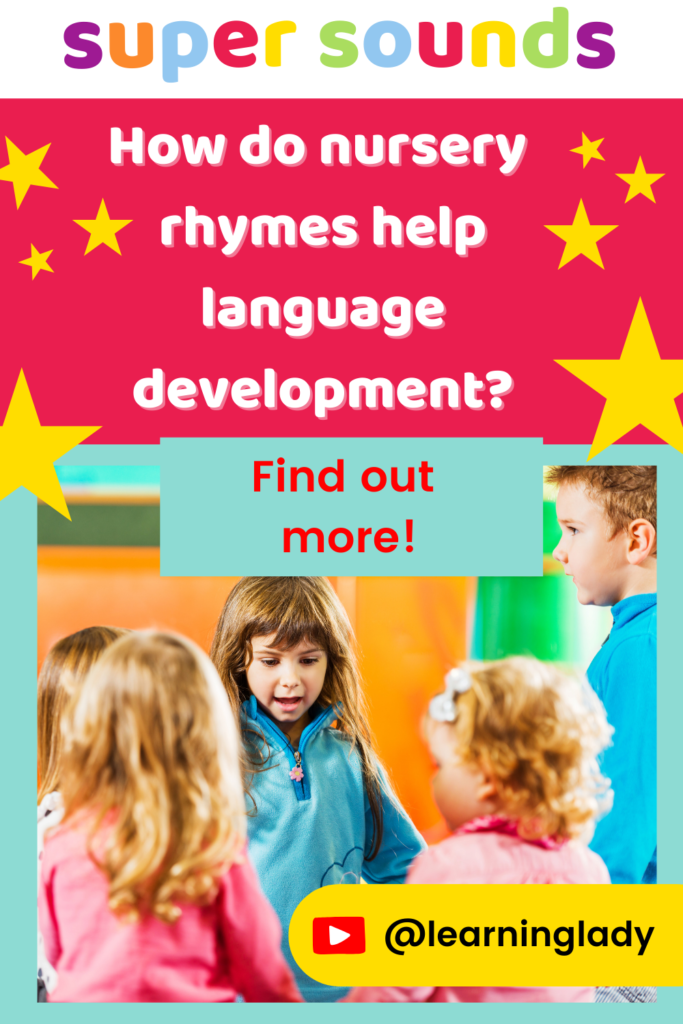
Nursery rhymes and action songs can introduce new words that build vocabulary in an age-appropriate way.
For example, Heads shoulders, knees and toes and If you’re happy and you know it are perfect for learning about body parts and actions.
Nursery rhymes like Little Miss Muffet, introduce words like ‘tuffet ’ and ‘curds and whey’, while Jack and Jill introduces a ‘pail’ of water, and the ‘crown’ on Jack’s head.
Developing Speech Sounds
Learning to say or sing nursery rhymes is also perfect exercise for mouth muscles and control of breath. These are essential for clarity of speech sounds during everyday talk.
Strong mouth muscles and careful control of breath are also critical for success in phonics, where children begin matching letters to spoken sounds.
Repeatedly joining in with nursery rhymes and songs helps to prepare preschoolers for reading using phonics when they start school.
Nursery Rhymes Wind the bobbin and other songs
To set your children up for success, it’s important to think of action songs in a simple progression, beginning initially with simple finger rhymes like Twinkle Twinkle Little Star or Incy Wincy Spider.
Over time, introduce more complex, whole hand finger rhymes like Tommy Thumb, and counting rhymes like Ten in the bed or 10 fat sausages, using hands for counting.
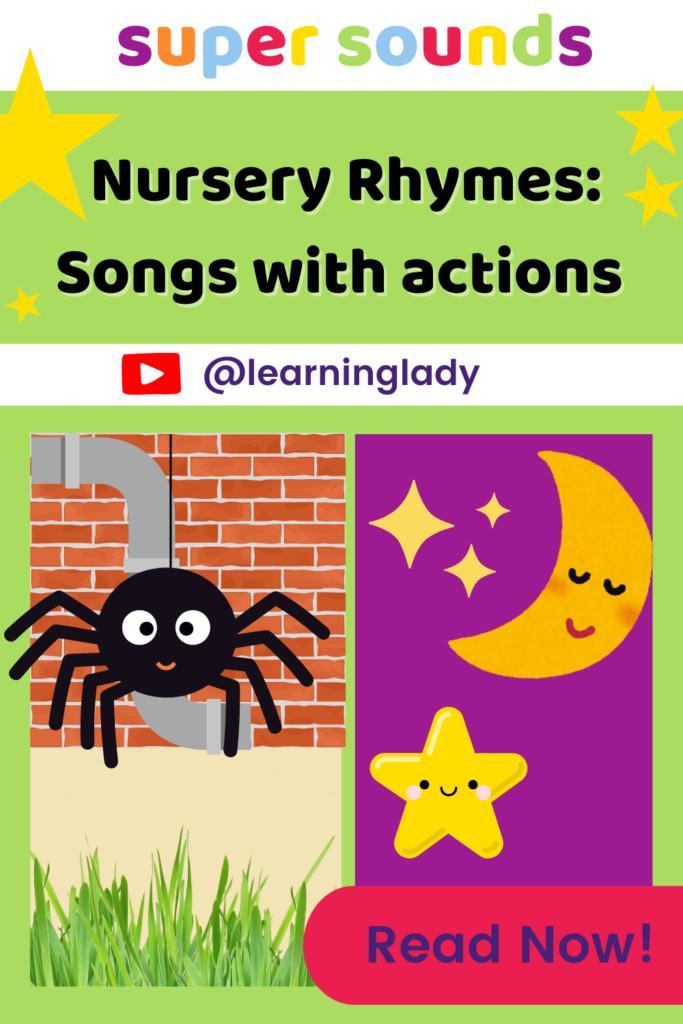
Action songs where children are using both hands and both feet exercise the left and right parts of the brain together. This is known as a cross lateral movement which benefits brain development and learning overall.
Here are some nursery rhymes with actions you can try…
Which nursery rhymes book to choose
There are so many benefits to reading and learning nursery rhymes and action songs, but which nursery rhyme book should you choose?
There are so many variations, from the super simple books with buttons to press and flaps to lift, to collections of classics with modern variations.
Nursery Rhymes London Bridge
Nursery rhyme activities for preschool using crafts
When we think of Nursery rhyme activities for preschool, craft activities can often be a popular choice. If you look through Pinterest in search of nursery rhyme activity ideas, you’ll mostly find examples of craft ideas for toddlers.
However, nursery rhyme craft activities have limited potential for the amazing brain activity outlined in this post. Often 2, 3 and 4 year-olds can engage in nursery rhyme craft activities without remembering the rhymes at all!
It’s always worth considering that the learning potential of nursery rhymes is to do with the brain based superpowers they develop, including:
- Clarity of speech sounds
- Building and exercising auditory memory
- Coordinating the body through cross lateral movements
While traditional nursery rhyme craft activities might seem like they are educational, think about whether these are meeting the learning and development potential for your 2, 3 and 4 year-olds, or if they are just a nice activity, based on a rhyme.
Fun nursery rhyme activities to try
If you’re looking for some fun alternative nursery rhyme activities to try with your 2, 3 and 4 year-olds, then this is a super simple game to start with. It easily helps children to match known songs and rhymes with symbols for prereading, and is great for supporting memory recall and turn taking too.
What you need
- A pocket die
- Pictures matched to nursery rhymes you’ve been learning. Here’s a free download you can use.
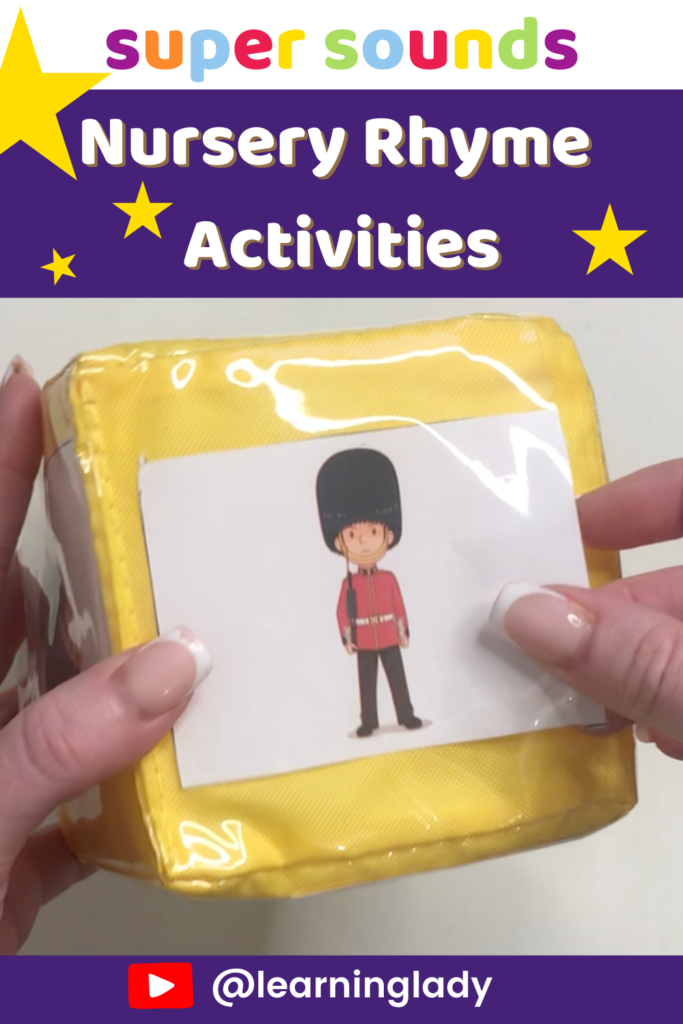
More nursery rhyme week ideas
International Nursery Rhymes Week is held every November, aimed at raising the profile and purpose of enjoying and learning nursery rhymes right from the start.
If you’re looking for more nursery rhyme week ideas to use with your children, then this easy peasy hide and seek game is for you!
What you need
2 x sets of the same picture which represent familiar nursery rhymes you’ve been learning together.
